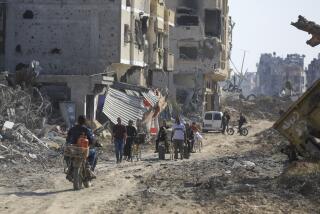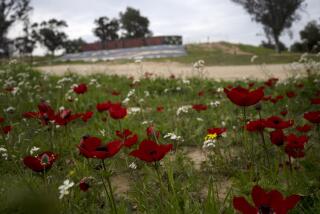Despair, hope in ruined Lebanon camp
NAHR EL BARED, Lebanon — When Mowaffak Akel first returned to his four-room home in this shattered refugee camp after almost four months away, he found shell casings and spent ammunition cartridges on the floor.
“My wife had a panic attack when she saw the photo of our late son lying on the floor covered with dirt,” Akel said. “We felt total despair.”
It’s been a month since the 38-year-old shopkeeper, his wife, Amal, and their eight surviving children returned to this Palestinian refugee camp along the northern Lebanese coast, the site of fierce battles this summer between Lebanese troops and a group of Islamists that left more than 300 people dead, tens of thousands homeless and much of the camp in ruins.
Although the center of the camp remains a sealed-off military zone, about 1,800 Palestinian families have been allowed to return to their homes in Nahr el Bared, which once housed about 40,000 people.
More than 70% of homes are heavily damaged and uninhabitable, according to local and international relief organizations. With no running water, limited electricity and damaged sewage pipes, many residents spend their days repairing their homes but sleep elsewhere at night.
Before the clashes, Nahr el Bared’s economy was the most robust among Lebanon’s 12 official refugee camps, which are home to a little more than half of the country’s estimated 400,000 Palestinians.
It boasted a large commercial street with low prices that attracted Lebanese shoppers. Now, many businesses are ruined and factories destroyed. The Lebanese government has pledged to reconstruct the camp and called on international donors to support the recovery.
“It is too optimistic to think that the camp could be reconstructed before two to three years,” said Alexandre Giraud, head of mission at Premiere Urgence, a French relief organization. “The damage is so heavy and intensive that it looks more as being the result of a natural disaster than that of an armed conflict.”
On a recent morning, men were busy repairing bullet holes in buildings, while women collected drinking water from large tanks and tried to scrub scorched walls and ceilings clean. Children dug through mountains of rubble for scrap metal to sell.
A few military vehicles patrolled near buildings that had collapsed during the months of shelling. Around noon, minivans distributed food aid brought in by humanitarian organizations.
The camp’s main street, once buzzing with shoppers, was reduced to a field of partially collapsed concrete structures, some with entire floors, walls and balconies drooping down. Paved roads had become treacherous swaths of mud and craters. Burned-out carcasses of vehicles, mounds of tangled metal rods, concrete fragments and torn curtains littered sidewalks.
Most buildings bore scars from the close-quarter fighting between Fatah al Islam rebels and military forces that engulfed the camp. Walls across the camp were covered with graffiti, Koranic verses left by Islamist militants or anti-Palestinian epithets scratched by soldiers.
The Akels try to keep their spirits up. But after a long day of chores, they brood over the fate of their camp.
“We wonder whether the camp will be rebuilt or not. We think about what will happen to our children,” said Akel, watching his sons playing in the mud next to a pile of broken, rust-covered appliances and torn couches.
“We used to see our friends and family relaxing on their balconies on the other side,” he said. “Now we see nothing but destruction.”
By early this month, Akel had sealed up his windows with nylon and patched holes. He had rented a small black-and-white television set and attached the antenna to the wall with a saucepan, and purchased a generator so he and his family could watch TV for a few hours each night.
He also had repaired the little shop near his house, and was back to selling groceries.
A few blocks from Akel’s home, Hoda Saleh, 40, hung out laundry, moving awkwardly in the ninth month of her pregnancy. Her son Yussef, 12, stood soaked and shivering after a dip in the river.
Saleh said she was taking care of the house while her husband, Ghassan, tried to peddle items scavenged from the camp’s ruins.
“We have no choice but to move on,” she said.
“I think, before, we lived happily here. Well, at least, I had the most beautiful roses in my garden.”
More to Read
Start your day right
Sign up for Essential California for news, features and recommendations from the L.A. Times and beyond in your inbox six days a week.
You may occasionally receive promotional content from the Los Angeles Times.






